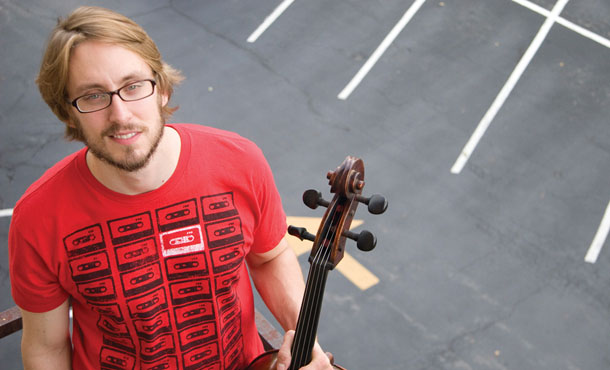As an undergrad at Eastern Mennonite University (EMU), Nathan Bontrager loved to experiment with music, a characteristic that has taken him through a master’s degree in modern cello in Maryland and into a second master’s program in early music in Germany.
“I am trying to be a musician playing the music I care about,” said Bontrager in an interview with an EMU reporter.
For him that passion is tri-faceted, where he plays: (1) early music, encompassing the medieval and Renaissance time periods; (2) “experimental” or “free improvisational” music; and (3) traditional music, which he explains as global music from oral traditions.
As a 2007 music major, Bontrager said he was not pigeonholed into a genre or required to only play a particular repertoire. In 2008, while enrolled in a master’s program in modern cello at the University of Maryland, Bontrager composed a piece for choir and instrumental ensemble as a tribute to an EMU classmate, Matthew Garber, who had died while on a mission trip in Costa Rica.
“I started to play a lot more contemporary music [at Maryland] – new music – modern classical stuff,” he said. “I also started to play the viola da gamba – that is how I started to get interested in playing early music.”
Like the cello, the viola da gamba is a bowed and stringed instrument, but it differs from a cello in that it has six rather than four strings and c-shaped holes rather than the typical f-shaped hole found on instruments in the violin family. The viola da gamba – also known as a viol – was most popular during the Renaissance and Baroque periods.
When Bontrager finished his master’s he moved to New Haven, Conn., where he “started to figure out what I wanted to do musically.”
There he ran across a group of people who were playing experimental music. “It is basically completely freely improvised or music that is using improvised elements combined with notated music,” he explained. “There are various kinds of improvised music and all of them have a language of their own.”
He began to play experimental music concerts in Connecticut with a trio called Broadcloth. One of the things he likes about experimental music is that it has no boundaries.
There are certainly regional and national styles that influence how a group of musicians play together, but “what makes it good or bad is totally up to the listener,” he said. “People are listening and reacting and creating something together. It’s about the music developing in an organic way.”
Hungry to spend time in another country and explore the European experimental scene, Bontrager found a master’s program in early music at Folkwang University of the Arts in Essen, Germany. He was also drawn to studying early music in one of the European countries that produced so many well-known composers.
“People who are interested in these new sounds are often the same people who are interested in Renaissance music,” Bontrager explained. “That may be because there are less stringent rules musically – that general idea of freedom in music is something that bridges those two worlds.”
He will be finishing his second master’s degree in the spring of 2014 but won’t necessarily return to the United States just yet. Next will be “a grand experiment to see if I can make a career out of what I like to do.”
On his website (nathanbontrager.com), Bontrager speaks of the pleasure of fostering love of music, as he did when he was music director at an Episcopal church near New Haven: “Working with the choir was fantastic, but the most compelling moments involved getting a mass of people who firmly believed they couldn’t participate in music to open their mouths and sing together, a cappella. . . .
“[M]usic makes things happen in the doing, listening, and creating that has powerful and necessary social implications for our larger lives.”
